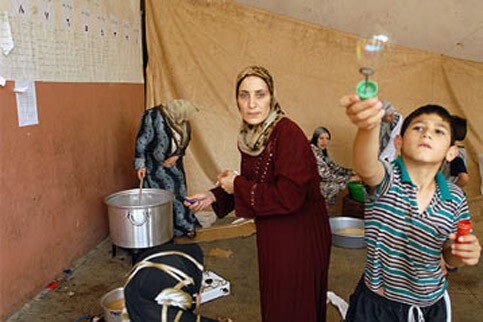United Nations High Commissioner for Refugees 24 July 2006

Displaced women prepare a meal as a boy finds something to take his mind off the spartan living conditions and scanty supplies at the Bourj Hammoud High School in Beirut. (UNHCR/C.Lau)
GENEVA -– UN High Commissioner for Refugees António Guterres said Monday that his agency is positioning more than 500 tonnes of relief supplies along the Syria-Lebanon border but urgently needs assurances of safe passage to deliver the supplies to tens of thousands of displaced people.
“The plight of the displaced in Lebanon is growing more difficult by the hour and it’s crucial that we get the humanitarian pipeline flowing now,” said Guterres. “UNHCR is trucking some 40 trailers loaded with over 500 tonnes of aid supplies from our regional warehouse in Jordan to Syria. It’s frustrating that we can’t deliver this aid, particularly when there are thousands of uprooted civilians just a few hours away in Lebanon who desperately need it.”
Relief supplies sent so far to Syria include 20,000 mattresses; 20,000 blankets; 5,000 family tents; 5,000 bales of plastic sheeting; 10,000 jerry cans; 5,000 stoves and 5,000 cooking sets. In all, UNHCR’s regional stockpiles in Jordan and Syria contain 250,000 blankets; 50,000 mattresses; 30,000 kitchen sets; 22,000 family tents; 17,000 stoves and other relief items. Additional quantities are also available in stockpiles in Kuwait and Iraq.
“It is absolutely vital to grant the humanitarian community access to these people,” Guterres said. “We have our teams ready to act and we have all kinds of supplies to help them on the border. But we’re unable to bring those supplies to the people who are in such a needy situation.”
The High Commissioner’s comments coincided Monday with a UN consolidated appeal for the Lebanon crisis that includes $18.9 million for UNHCR activities aimed at helping 150,000 vulnerable displaced people in Lebanon and neighbouring countries for an initial period of three months. The United Nations estimates some 700,000 people have been displaced by the conflict.
As part of a joint UN approach to the crisis, UNHCR will be responsible for protection activities as well as for shelter and site management. Its tasks include ensuring the physical and material safety of vulnerable refugees and internally displaced people in Lebanon, Syria and surrounding countries, with emphasis on women, children and the elderly. UNHCR’s work also involves border monitoring and facilitating entry for all new arrivals in Syria and ensuring they are identified, registered and referred to the relevant organisation for help.
Members of a UNHCR emergency team are monitoring the border in four places and says some 15,000-20,000 people are crossing daily into Syria – most are Lebanese fleeing the conflict. The Syrian Red Crescent is providing most of the assistance, but many Syrians have taken people into their own homes and others are being housed in public buildings, institutions and schools.
Some third country nationals are crossing into Syria, but in smaller numbers than in previous days. UNHCR is liaising with the International Organization for Migration to ensure they get assistance.
Some groups of nationals, such as Sudanese, are stranded at the border waiting for help from their embassies. The UN Relief and Works Agency for Palestinian Refugees in the Near East (UNRWA) is liaising with the authorities and assisting Palestinians trying to cross into Syria.
UNHCR has enough non-food items to distribute to 75,000 needy arrivals in Syria and is increasing warehouse capacity in Damascus.
Other UNHCR activities will include mapping of all sites housing internally displaced people; identifying additional accommodation for the displaced; assisting host families who are now caring for uprooted people; and the provision of humanitarian assistance.
In addition to pre-positioning tonnes of relief supplies, UNHCR has sent a 19-member emergency response team comprising humanitarian specialists who will augment the agency’s staff in Syria and Lebanon. Members of the team are flying in from around the world and should be on the ground by week’s end.
UNHCR is setting up a logistics base in Cyprus, but with the agency’s large Middle East stockpiles located in Jordan and Damascus, the land route from Syria to Beirut would be a much faster option.
In Lebanon, UNHCR teams are working with local authorities north of Beirut, assessing the displacement situation and buying supplies, particularly of mattresses, to help ease the strain on those living in public buildings. In the Aley Valley, there are more than 38,000 displaced people living in schools, out of a total displaced population of more than 80,000 in the area. Those not living in schools have found shelter with family and friends or are living independently.
“At the schools, people are traumatised and anxious,” said UNHCR’s top official in Lebanon, Arafat Jamal. “The conditions are very precarious. There’s a lot of overcrowding, with people sleeping three families to a room and tremendous pressure on the sanitation facilities.”
Related Links